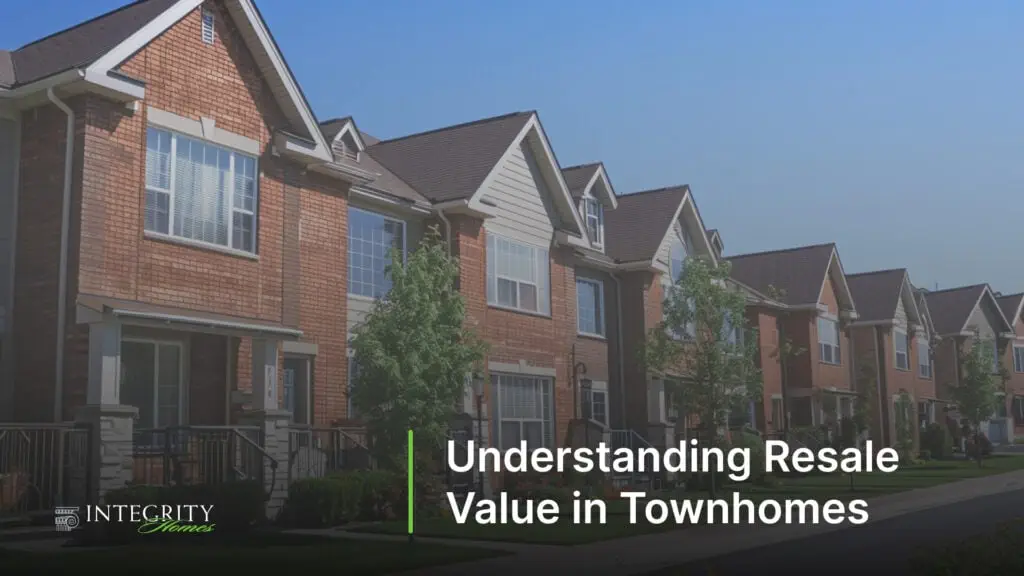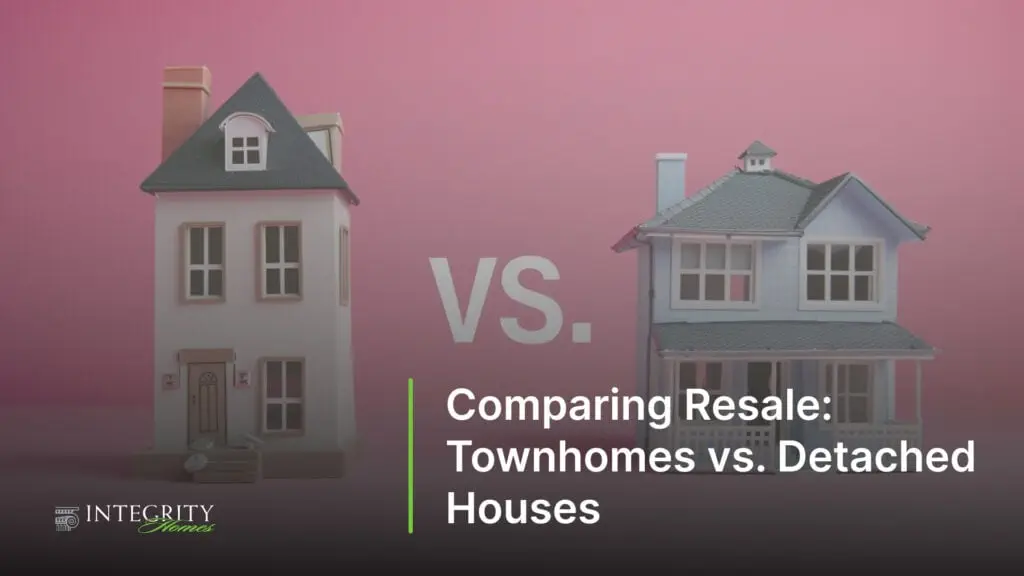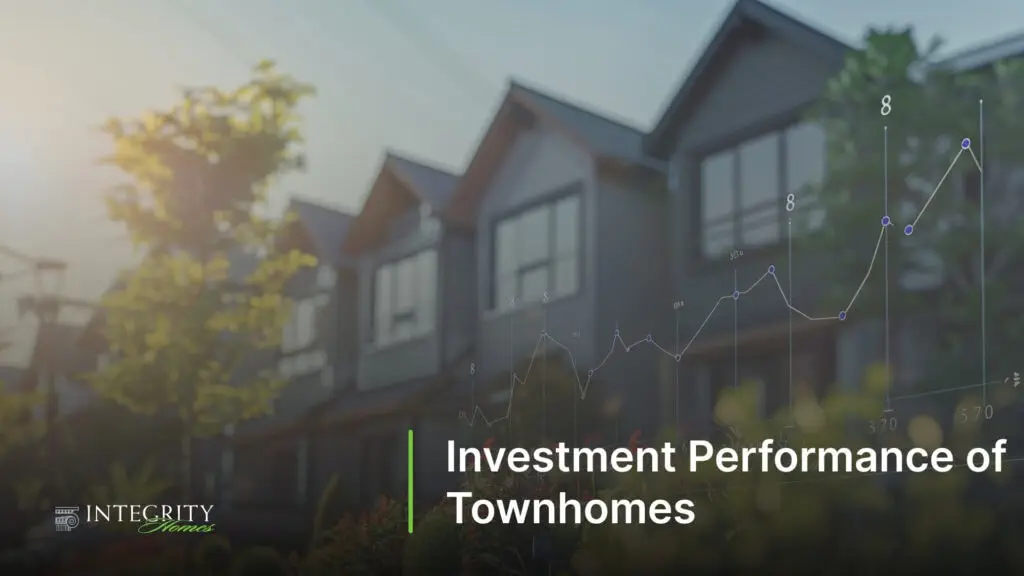
The resale value of townhomes is a pressing question for potential buyers and investors, leading many to ask, “do townhomes have a good resale value?” While some factors like emerging market trends, strategic locations, and the homes’ upkeep can enhance resale value, other elements, such as HOA fees, may detract from it. This balanced article cuts through the complexity to offer a clearer picture, comparing townhomes to single-family homes and highlighting how they perform as long-term investments.

Investors in the real estate market need to keep the potential resale value of their properties at the forefront of their decision-making process, which is equally true for townhouses. The eventual resale price can be greatly influenced by various elements including upkeep expenses, the situational context of the property, and its state of repair.
Townhomes that boast energy efficiency and contemporary aesthetics tend to fetch a higher resale price. This is particularly accurate when these homes are situated within neighborhoods that are highly desirable.
Throughout time, the evolution of market trends has been instrumental in molding the resale values of townhomes. The factors that propel changes within the marketplace for these residences include:
Collectively, these elements among others are influential in causing variations in the resale value of townhomes.
The value of a townhome as an investment property is heavily influenced by its location, with some areas yielding higher returns than others. This places the emphasis on geographic position within your investment strategy for townhomes and raises the pertinent question: “Are townhomes considered to be a good investment?”
The resale value of a townhome is heavily influenced by its state and the level of upkeep it receives. Properties that are kept in good condition, featuring contemporary amenities and improvements for energy efficiency, are more attractive to prospective buyers, thereby increasing their market value.
The creation and maintenance of strong relationships between landlords and tenants play a crucial role in maintaining the property’s condition. This maintenance is key to sustaining the townhome’s appeal on the market, which directly affects its potential resale value.

When examining the long-term resale value of townhomes versus detached houses, it becomes clear that while townhomes are townhouses, detached houses are not. Hold their value, they do not appreciate at the same rate as single-family homes like a detached house. The reduced maintenance obligations associated with owning a townhome might appeal to specific buyers and thus could have an advantageous impact on their resale potential.
Rental demand, especially from young adults, can greatly affect the potential resale value of townhomes. Yet, owning a townhome involves certain challenges like reduced privacy and possible HOA fees that might impact the dynamics of both renting and reselling.
The resale value of a townhome can be impacted by HOA fees, which are common in this type of property ownership. These fees help to maintain shared spaces and contribute to the overall monthly expenses for residents.
There is an advantage as these fees also aid in lowering insurance premiums for townhomes. This reduction is often appealing to prospective purchasers since townhomes share at least one wall between neighboring units, influencing insurance costs positively.
Community amenities like swimming pools and tennis courts, along with a strong sense of community, greatly impact the desirability and value of townhomes. These features are particularly appealing to retirees and young families looking for attractive living spaces.

Investing in townhomes is appealing thanks to their cost-effectiveness, the benefit of owning land, reduced upkeep needs, and simplicity when it comes to renting them out.
The allure of regular rental income and the chance for an increase in property value draw investors towards townhomes. Nevertheless, those considering such investments should be mindful of recurring costs like upkeep expenses, taxes, and possible HOA fees while determining a townhome’s investment returns.
Townhomes offer an entry point into the real estate market with less upfront capital required compared to single family homes. For those weighing the option of a single-family home, townhome investments can provide robust returns thanks to their relative affordability and typically reduced upkeep expenses.
The steady and reliable income generated from renting out townhomes can lead to an increase in their capital worth, thus enhancing their resale value. There is a strong market for rental properties, which reinforces the notion that townhouses are a robust investment choice, offering the possibility of garnering both short-term and long-term rental income.

The investment aspect of townhomes is heavily affected by homeowners associations (HOAs). Their established guidelines and limitations can have a profound effect on the ways in which properties are utilized and lifestyle preferences, which may in turn influence the resale value of the townhome.
These organizations are instrumental in maintaining communal facilities and shared spaces, which is vital to shaping how a townhome’s value is viewed.
Exterior maintenance managed by an HOA aids in maintaining the curb appeal of townhomes. These services, which include everything from taking care of lawns to cleaning roofs, assist in keeping the outside of a townhome looking appealing and increasing its attractiveness to prospective purchasers.
Homeowners’ associations that effectively manage communal facilities can significantly boost the appeal of homes when they are back on the market. Shared amenities that not only enhance community spirit but also have a beneficial impact on the resale value of a townhome include:
Dedicating resources to these features and maintaining them well can elevate the desirability of your townhome neighborhood in the eyes of prospective purchasers.

Real estate agents evaluate the investment worth of townhouses by considering aspects like:
For investors, it is imperative to grasp these elements and engage in extensive market research as a strategy to enhance the resale value.
By conducting thorough market research and taking into account upcoming developments, investors can set a pricing strategy for their townhouse investment that is both equitable and yields profits. This approach ensures the establishment of an informed and accurate value for their property.
By maintaining efficient management and adhering to legal requirements, strong relationships between landlords and tenants can be fostered. This contributes significantly to the upkeep of the property’s condition, thereby increasing its potential resale value.
Townhome owners who stay informed about forthcoming developments in the area can tweak their approaches to gain a competitive advantage when it comes time to resell.

The consistent attractiveness of townhomes among various groups, including small families and young professionals, signifies a stable demand for rentals. The shift in what renters prioritize—seeking an equilibrium between cost-effectiveness, living space, and proximity to communal facilities—is the shift in what renters prioritize. Propels the rental demand for these homes.
For first-time buyers and young families seeking a balance between cost-effectiveness and community-oriented comfort, townhomes offer an attractive option. They provide a more affordable alternative to the higher costs that come with owning detached houses, while still aligning with increasing desires for pleasant, neighborhood-focused lifestyles.
Persistent high demand for townhomes, especially in locales favored by young adults, remains a trend. The appeal of these properties is often augmented when situated close to business centers and areas rich in entertainment options, bolstering their success as rentals. Insight into the rental market can assist investors in making knowledgeable choices within this buoyant segment, where rental demand shows no signs of waning.
Undoubtedly, townhomes stand out as a viable investment choice due to their mix of cost-effectiveness, the allure of community life, and prospects for value increase. Nevertheless, investors should weigh elements like the property’s site, Homeowners Association (HOA) fees, and its state before committing financially. When done with careful analysis and strategic planning, investing in townhomes can prove to be beneficial.
Certainly, investing in townhomes may prove to be a wise financial decision owing to their lower purchase cost, the regularity of rental income they can generate, and the possibility for value increase over time. Nevertheless, investors should meticulously evaluate aspects like the property’s position geographically, Homeowners Association (HOA) fees that must be paid regularly and the current state of repair before proceeding with such investments.
The location of a townhome significantly impacts its resale value, with some locations offering better returns than others, making it a critical factor in investment strategy.
The resale value of a townhome can be affected by HOA fees as they add to the monthly expenses for homeowners, although these fees may also decrease insurance costs and thereby attract potential buyers.
Amenities within a community, such as swimming pools and clubhouses, not only help to cultivate a communal atmosphere, but also significantly enhance the appeal and resale value of townhomes.
When evaluating the investment value of townhomes, real estate professionals focus on key aspects such as the appeal of the location, demand for rentals, state of the property, and its prospective appreciation. These elements are vital in ascertaining the total worth of the investment.
Maryland | Frederick, MD | National Harbor, MD | Potomac, MD
Virginia | Alexandria, VA | Fairfax, VA | Lorton, VA | Northern, VA | Stafford, VA | Stephenson, VA | Winchester, VA | Washington DC